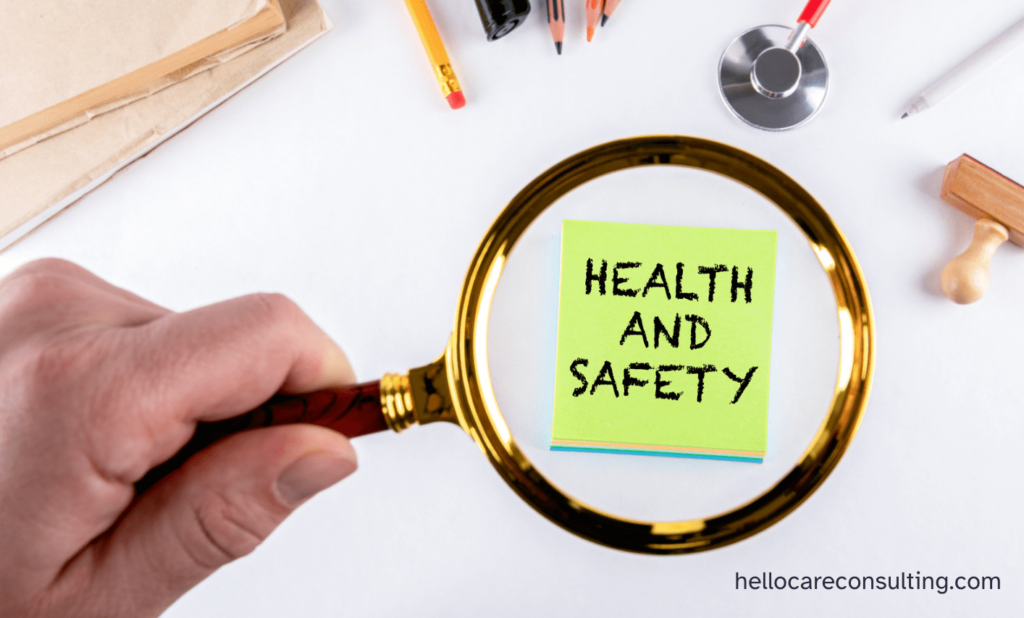Description
Mandatory Care Training
Care Mandatory Training – Assisting and Moving People
On various scenarios, the assistance and movement of individuals hinge on the worker’s assigned role and responsibilities. Adequate training is essential to empower the worker to:
- Safely move and position an individual.
- Utilize any necessary equipment.
- Comprehend current legislation, national guidelines, policies, procedures, and protocols related to moving and positioning individuals.
- Grasp the physiology and anatomy involved in moving and positioning individuals.
- Effectively minimize risks before moving and positioning individuals.
- Recognize when to seek advice or assistance from others during the process.
This falls within the Safety fundamental standardset by theCQC. It is advisable to refresh and assess learning, knowledge, and competency at least annually, and also when introducing a new risk. Refer to the list of mandatory training for carers above.
Care Mandatory Training – Basic Life Support and First Aid
All care staff must undergo basic life support and first aid training. Basic life support knowledge entails understanding and following procedures for responding to accidents and sudden illness, with carers capable of providing such support. The minimum learning outcome for first aid is typically set by the awarding organization.
This knowledge aligns with the CQC fundamental standards, particularly those related to safety. Establishments are obligated to ensure sufficient personnel are available to respond in case of illness or injury at work. The employer determines the number of people requiring training and the appropriate level.
Skills for basic life support should be refreshed annually, with learning and development provided as needed. Conversely, first aid training should be refreshed every three years for recognition of competence. Refer to the list of mandatory training for carers.
Mandatory Care Training – Communication
Possessing effective communication skills is crucial for care workers. They should grasp the significance of communication in health and social care, especially when collaborating with colleagues, and be adept at meeting individuals’ communication and language needs, preferences, and wishes. This proficiency helps minimize communication barriers. Additionally, care workers should apply principles and practices related to confidentiality in their work.
Communication skills are integral to meeting the CQC fundamental standards, particularly those related to person-centred care, dignity, and respect. Employers are tasked with monitoring performance, conducting annual assessments of knowledge and competence, and offering learning and development opportunities at least every three years, as well as when required or identified.

Mandatory Training for Care Workers – Dignity
Every care worker should comprehend the principles supporting dignity in care to uphold the dignity, respect, and privacy of service users.
This aligns with the CQC fundamental standards, specifically in the domain of dignity and respect. Employers are responsible for regularly monitoring staff performance, conducting annual assessments of knowledge and competence, andensuring learning and development opportunities are provided at least every three years or as needed and identified. Refer to the list of mandatory training for carer workers above.

Mandatory Training for Care Workers – Equality & Diversity
The importance of inclusion equality and diversity must be understood by all members of staff. They must be able to work inclusively and know how to access vital information, advice and support regarding equality, diversity and inclusion.
This will class as the CQC fundamental standards (dignity and respect, and safeguarding from abuse). Similar to communication and dignity, equality and diversity performance must be monitored and knowledge and competence must be assessed at least every year. Employers must provide learning and development opportunities when identified or required, and at least every 3 years. Refer to the list of mandatory training for home carers.
Mandatory Training for Care Workers – Fire Safety
Ensuring fire safety is of utmost importance, not only for the well-being of service users but also for the protection of employees and the facility. It is essential to ensure that everyone in your care service comprehends and is capable of promoting fire safety within the work setting.
This falls under the CQC fundamental standard, specifically related to safety. According to the BS 9999:2008 Code of practice for fire safety in the design, management, and use of buildings, it is recommended that training be refreshed annually. Guidance on meeting legislative requirements is available from the Department for Communities and Local Government. Additionally, conducting fire drills annually is advised. Refer to the list of mandatory training for home carers.
Mandatory Training for Home Care Workers – Food Hygiene
If your carers handle food, it’s crucial for them to understand and adhere to food safety measures when providing meals and beverages to individuals. They should also be proficient in:
- Maintaining hygiene during food and drink handling.
- Meeting safety requirements during food and drink preparation and service.
- Adhering to safety requirements during food and drink cleanup.
- Safely storing food and drink.
- Knowing how to seek additional advice or support regarding food safety.
This training aligns with CQC fundamental standards, specifically related to premises and equipment, as well as safety. According to the law, all workers involved in handling, preparing, or providing food must undergo appropriate training in food safety.
To ensure compliance, their performance should be closely monitored, and their knowledge and competence assessed annually. Learning and development opportunities must be provided at least every three years, and when identified or deemed necessary. Refer to the list of mandatory training for home carer workers.
Mandatory Training for Home Care Workers – Health & Safety Awareness
Prioritizing health and safety not only safeguards your workforce but also reduces absences and enhances workplace productivity. In the context of health and safety within the work setting, it is essential for your team to comprehend their responsibilities and those of others. They should be proficient in using risk assessments, managing hazardous substances, implementing workplace security measures, and addressing stress.
This falls within the CQC fundamental standard (safety). Continuous monitoring of performance is necessary. Employers should conduct assessments of knowledge and competence at least once a year, with learning and development opportunities made available every three years, as well as when identified or deemed necessary. Refer to the list of mandatory training for carer workers above.

Mandatory Training for Home Care Workers – Infection Prevention and Control
In the realm of care, preventing and reducing the transmission of infectious diseases is imperative to maintaining the health of individuals. Care providers should have a comprehensive understanding of:
- Their own and others’ roles and responsibilities in preventing and controlling infections.
- Legislation and policies pertinent to the prevention and control of infections.
- The significance of risk assessment in relation to preventing and controlling infections.
- The importance of utilizing Personal Protective Equipment (PPE) in infection prevention and control.
- The role of good personal hygiene in preventing and controlling infections.
This aligns with the CQC fundamental standard (premises and equipment). Employers are tasked with monitoring performance, conducting assessments of knowledge and competence at least annually, and providing learning and development opportunities every three years, as well as when identified or deemed necessary. Refer to the list of mandatory training for carers.
Mandatory Care Training – Medication Management
In the field of care, a comprehensive understanding of medication management is essential. This involves overseeing prescribed medications for service users to ensure correct intake and achieve planned outcomes. Care workers should grasp:
- Legislation, policies, and procedures relevant to medication administration.
- Common types of medication and their uses.
- Procedures and techniques for administering medication.
- Preparation for the administration of medication.
- Safe administration and monitoring of medication.
Additional training may cover specific medicines (e.g., patches, creams, eye drops, liquids, and inhalers) and specialized training for particular medications like Buccal midazolam. All this training aligns with the CQC fundamental standard (safety).
NICE suggests refreshing learning for care home and community-based staff, with an annual assessment of knowledge and competence. Learning and development requirements depend on the worker’s role and responsibilities, with training and competency checks tailored to the type of service provision and agreed responsibilities.
It’s crucial to note that workers should not manage or administer medicines until they have undergone full training and assessment for any required skills. Refer to the list of mandatory training for home carer workers.
